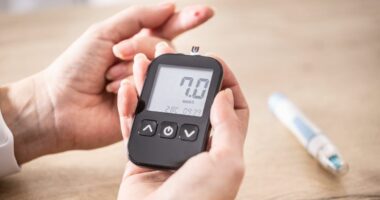Share this @internewscast.com
Donald Trump captured headlines when he told pregnant women, ‘do not take Tylenol,’ because of concerns about its potential links to autism.
While studies on the link between taking acetaminophen (Tylenol) during pregnancy and autism are not definitive, the majority of medical professionals consider this medication the safest choice for managing fever or pain in expectant mothers.
However, new concerns have been raised by researchers advising pregnant women to be cautious with other medications, including those for nausea, due to potential connections to an increased risk of their offspring developing cancer later in life.
Caitlin Murphy, a cancer epidemiologist from the University of Chicago leading studies on this topic, shared insights with the Daily Mail: ‘Our research indicates that occurrences in the earliest stages of life can influence the likelihood of developing cancer many decades afterward.’
The rise of early-onset cancers among young adults has raised alarms among health officials, with Millennials (born between 1981 and 1996) facing a greater risk of 14 different cancers compared to the previous generation.
They are also nearly twice as likely as their parents to develop colon cancer.
Though higher obesity rates and ultra-processed food consumption have been blamed by doctors, some specialists are now focusing on changes in medical practice during the latter part of the 20th century as a contributing factor.
During this period, pregnant women began routinely receiving medications for a range of issues, including depression, nausea, infections, and hormonal changes, marking a significant shift from earlier practices, according to Murphy.

President Trump is pictured above during the press conference where he warned pregnant women not to take Tylenol (acetaminophen) despite conflicting evidence

The above shows how the proportion of pregnant women taking prescription medication has risen in the US in recent years. It is based on data from Providence St Joseph
Murphy said: ‘Colon cancer was increasing in young people, and I noticed in the epidemiological data that there was this really clear birth cohort effect, or that the rates were really increasing among people born after 1960.
‘As an epidemiologist, when I see that kind of trend, it signals to me, “Aha! There might be something very early in life that’s contributing to this phenomenon.”
‘And when I say very early, I mean as early as gestation.’
Among commonly prescribed medications was Bendectin, a prescription drug used to treat morning sickness. Murphy’s research found that children of mothers who took the drug while pregnant were twice as likely to develop colon cancer as those whose mothers did not.
The drug was withdrawn by its manufacturer in 1983 amid lawsuits alleging it caused birth defects. But a component of the medication, Dicyclomine, known as Bentyl, is still available with a prescription. It is used to treat irritable bowel syndrome, and studies have only linked it to cancer if used during pregnancy.
Concerns have also been raised over hydroxyprogesterone caproate, known by the brand name Makena, given to women carrying high-risk pregnancies to prevent miscarriages.
Murphy studied the drug in 2021, and found that children of mothers who took the medication while pregnant had double the overall risk of cancer compared to kids whose mothers didn’t. Most of the cancer patients were under 50 years old.
Her study also showed that children of mothers who took the drug while pregnant had a five times higher risk of colon cancer and a four times higher risk of prostate cancer.
Hydroxyprogesterone caproate was withdrawn from the market by the FDA in 2023 after post-approval studies showed it was no more effective than a placebo, but it has been taken by women in the US since the 1950s.
Research has also linked consumption of certain antibiotics during pregnancy to a potentially higher risk of a child developing cancer later in life; and using antihistamines during pregnancy was linked to a nearly three times higher risk of liver cancer for their children.
Though they suggest possible ties, these studies do not prove that taking certain drugs directly caused the offspring’s cancer.
Still, Murphy said the ‘pretty strong signals’ she gets from the data make her ‘very confident’ that the drugs are having an impact.
‘We’ve also done a number of sensitivity analyses to investigate alternative explanations and really, no matter what we adjust for in our models, no matter what subpopulations we look at, nothing explains away what we’re seeing in the data.
‘As such, I feel very confident that what we’re seeing is real.’
The risk detected in the studies exists only for the children of women who took the drugs while pregnant, rather than for anyone who has ever used the drugs and then become pregnant.
It was not clear what may be causing the potential link, but studies suggest that the drugs may interfere with developing organs in the womb.
Up to 95 percent of pregnant women in the US now take at least one prescription medication during pregnancy, estimates suggest, compared to 50 percent in the 1970s.

Doctors prescribe drugs to pregnant women to help manage conditions that can harm both mother and baby, experts say
In addition to reducing pain and nausea, the drugs are used to manage chronic conditions like depression and diabetes that can harm both the mother and the baby if left untreated.
Doctors say that in many cases the drugs are prescribed after carefully weighing the risks of side effects against the impacts of not treating the condition.
Murphy said she had ‘no good answer’ for worried mothers who took the drugs while pregnant – or their children. But suggested that everyone should keep up to date with their recommended cancer screenings, as detailed by the American Cancer Society.















